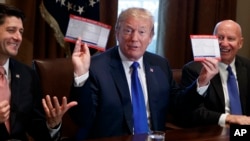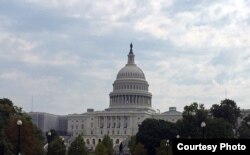Republican leaders in the U.S. House of Representatives, with the support of President Donald Trump, unveiled a vast overhaul of the country's tax policies on Thursday, changes that would sharply cut taxes for corporations and some middle-class families.
The $1.5 trillion plan, produced by senior lawmakers after months of internal debate, would cut the corporate tax rate from the current 35 percent to 20 percent, a longtime goal of Republicans looking to give American companies an edge over foreign competitors and to keep U.S. businesses from leaving for foreign locations in search of cheaper labor.
It would add the same amount to the country's growing $20 trillion in long-term debt.
The proposal would also eliminate or trim an array of benefits that individuals have used for years to cut their tax bills, while at the same time lowering their tax rates and creating three new individual tax rates of 12, 25 and 35 percent. But in the hours after the plan was made public, the net effect for many taxpayers was uncertain, almost assuredly dependent on each family's specific financial circumstances.
“With this plan, we are making pro-growth reforms, so that yes, Americans can compete with the rest of the world,” said House Speaker Paul Ryan, a longtime advocate for the tax overhaul.
Trump said he wants the Republican-controlled Congress to approve the legislation by Christmas on December 25, but rancorous debates over it are expected. The Democratic minority in Congress is largely opposed, contending that the proposal would benefit wealthy taxpayers the most at the expense of those with much less income.
A lobbying group for small businesses quickly announced its opposition over changes it said would leave "too many small businesses behind." Real estate interests also voiced objections to a proposal that would limit the amount of mortgage interest taxpayers could deduct from their tax bills on newly purchased homes and cap the existing deduction for local real estate taxes at $10,000, which would impact homeowners in such high-cost cities as San Francisco, New York, Boston and Washington.
Trump, after Congress failed to approve a health care policy overhaul in recent months, is without a major legislative victory during his first nine months in office. But he is hopeful Congress will adopt the tax plan.
"We’re working to give the American people a giant tax cut for Christmas," Trump said. "We are giving them a big, beautiful Christmas present in the form of a tremendous tax cut. It will be the biggest cut in the history of our country. It’ll also be tax reform, and it’ll create jobs."
He said the legislation would ... "create tremendous prosperity for our nation. We will provide a massive tax cut for American families, we will make the tax code simpler, and fair. It’s called simplification."
Trump added, "We will restore our competitive edge by reducing business taxes for the first time in more than 30 years, and we will bring back trillions and trillions of dollars that’s now parked overseas so that money can be put to work rebuilding the United States of America, as opposed to rebuilding other parts of the world.”
He offered his tax remarks at the White House alongside Hock Tan, the chief executive of Broadcom Limited, who announced the semiconductor manufacturing company is relocating from Singapore to the United States, bringing back $20 billion in annual revenue to the United States.





